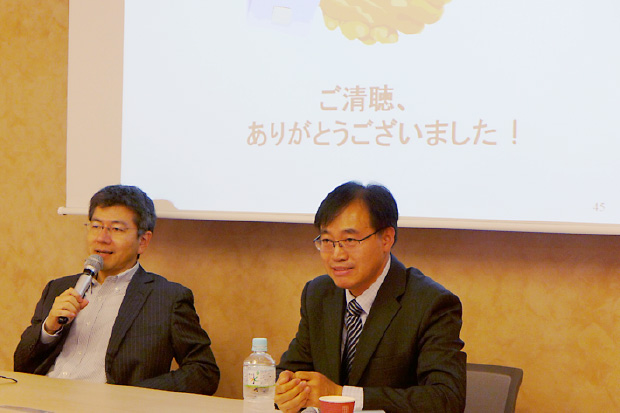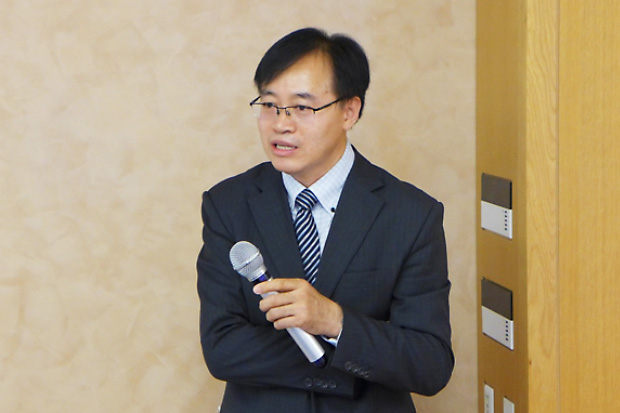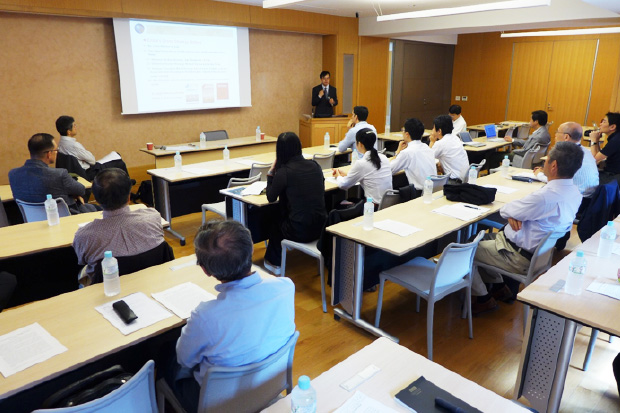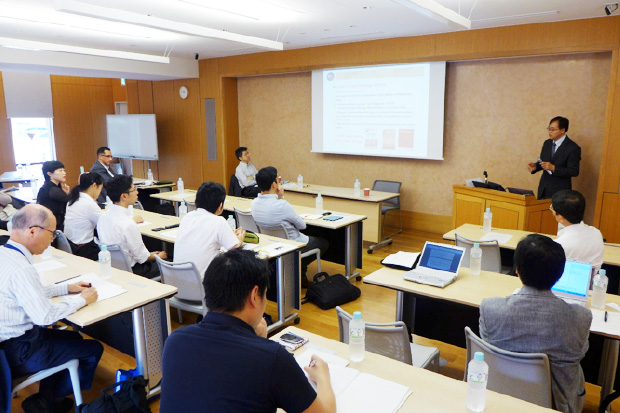SSU Forum with Professor Honghua Men
| Date: | Monday, September 28 2015, 10:30-12:00 |
|---|---|
| Venue: | Seminar Room, 3rd Floor, Ito International Research Center |
| Subject: | China's Grand Strategy: A Framework Analysis |
| Lecture: | Honghua Men, Professor of Central Party School/Dean of the School of Political Science & International Relations, Tongji University |
| Language: | English |
| Hosted by: | Security Studies Unit, Policy Alternatives Research Institute, the University of Tokyo |
| Co-hosted by: | The Economy-Security Nexus |
The SSU was delighted to invited Honghua Men, Professor of International Relations and Director of the Institute for China and World Studies at the Tongji University of Shanghai, to deliver a talk entitled “China’s Grand Strategy in a Changing World”. The event was hosted with the support of the Japan Foundation for the Promotion of Science. Professor Men is currently a Visiting Scholar at the University of Tokyo.
Professor Akio Takahara chaired the event, introducing Professor Men as an extremely prolific writer, distinguished scholar and very established academic, despite his young age, who has routinely offered fresh and insightful analyses of China’s relations to the world.

Professor Men thanked Professor Takahara for hosting this event and for the opportunity to pursue research at the University of Tokyo as a visiting scholar, and immediately proceeded to illustrate the topic and purpose of his talk, which focused on China’s grand strategy, the possible ways to think about it, and the sort of questions which it shall encompass.
Firstly, Professor Men explained to the audience that a discourse about Chinese grand strategy is a relatively recent product. He reminded about existence of several different theoretical formulations of the grand strategy concept. In past decades, when China was still emerging from the long crisis initiated in the nineteenth century, little or no discussion of such kind was taking place. However, the landscape has changed rather rapidly with the rise of China starting from the 1990s, and today, the problem of formulating a grand strategy for China appears almost unavoidable, albeit at the same time very complex. In Professor Men’s view, the construction of a grand strategy is affected by a number of factors, such as the pressure coming from ongoing world trends. Among those, he has particularly identified the dynamics of globalisation, but also of the formation of regional clusters, and China’s interest in playing a constructive role in its neighbourhood. Besides, a grand strategy has to deal with the issue of changing perspectives in a world characterised by shifting power, problems, and paradigms.

Historically, the grand strategy discourse in China has been deeply conditioned by the past, especially considering the different experiences which have characterised Beijing’s position and behaviour with relation to the rest of the world. From a tradition of isolationism and tribute-based system, China has struggled to integrate itself in the modern world in the era of imperialist competition, and embraced after the 1949 establishment of the People’s Republic a revolutionary conception of international politics, according to the principles of Marxist-Leninism, grounded on a formal alliance with the USSR. However, after the Sino-Soviet split in the 1960s, China has partially reverted to an isolationist position, partially acquired an independent conduct in world affairs. From the 1990s onwards, Beijing has become far more engaging, taking over new roles and responsibilities in the management of global politics.
Professor Men has pointed out that a grand strategy cannot simply consider, as might have been the case in the past, the strategic and security position of the country, but should be based additionally on positive participation, shared responsibility. Keeping a low profile appears also to be a key element for success.
China not only has to respond to challenges coming from the world, but these are dynamically linked back to what happens inside China. China is also changing the world, by influencing it thought the power of the sheer size of its population, economy, trade, political weight.

Furthermore, a grand strategy for China has to encompass the thorny question of re-shaping the country’s identity. This is partly a question of the ongoing reforms, which continue restlessly, but also a more complex issue of re-building an image of the country which may bridge modernisation, Chinese cultural heritage, and the expectations from the rest of the world.
All these present and future transformations will only be possible by keeping a humble spirit and willingness to learn from other nations, as the transformation and modernisation of China will continue in the decades to come, spurred by the need to fill the gap between the different levels of development in the various regions of the country, as well as between urban and rural areas. As Professor Men remarked, China is in a rather unique situation of an a-typical developing country, where very diverse levels of development co-exist next to each other.
In conclusion, Professor Men advocated the need to design the future of China’s relation to the world under the sign of humble, gradual but steady self-perfection, as in the best of Chinese philosophical tradition.

-
Professor of Central Party School/Dean of the School of Political Science & International Relations, Tongji University
